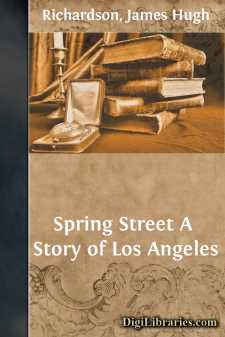Categories
- Antiques & Collectibles 13
- Architecture 36
- Art 48
- Bibles 22
- Biography & Autobiography 813
- Body, Mind & Spirit 142
- Business & Economics 28
- Children's Books 15
- Children's Fiction 12
- Computers 4
- Cooking 94
- Crafts & Hobbies 4
- Drama 346
- Education 46
- Family & Relationships 57
- Fiction 11828
- Games 19
- Gardening 17
- Health & Fitness 34
- History 1377
- House & Home 1
- Humor 147
- Juvenile Fiction 1873
- Juvenile Nonfiction 202
- Language Arts & Disciplines 88
- Law 16
- Literary Collections 686
- Literary Criticism 179
- Mathematics 13
- Medical 41
- Music 40
- Nature 179
- Non-Classifiable 1768
- Performing Arts 7
- Periodicals 1453
- Philosophy 64
- Photography 2
- Poetry 896
- Political Science 203
- Psychology 42
- Reference 154
- Religion 513
- Science 126
- Self-Help 84
- Social Science 81
- Sports & Recreation 34
- Study Aids 3
- Technology & Engineering 59
- Transportation 23
- Travel 463
- True Crime 29
Spring Street A Story of Los Angeles
Description:
Excerpt
His father was dying.
John Gallant paced the narrow sun-baked lawn between the porch of his home and the street.
Soon, he knew, the door would open and he would be called inside. That would be the end. A sickening feeling of terror gripped him and his heart pounded in his chest.
He took a step toward the door, which was really an involuntary movement. No, he couldn't go in there. The doctor was in a chair at the bedside, watching, helpless. He would only look up and say again that there was nothing to do but wait.
For a moment he hated that doctor because he sat there without doing a thing. His brain, inflamed and racked by the strain, throbbed in his head. He had a distorted idea that the doctor was making a coldly scientific observation of his father's death, perhaps taking mental notes for a paper to be read to a class of medical students.
He had tried waiting inside. That Mrs. Sprockett from across the street, who was with his mother, had whispered to him to be brave. His mother sat very still in her rocking chair, her head bowed, her hand pressed to her eyes. He knew she was praying. Unable to hold himself, he had dropped at her feet and buried his head in her lap. He had cried brokenly, his shoulders heaving spasmodically, and he had felt her hand gently touching his head.
They had not spoken, but the feeling that she was suffering with him had assuaged his agony until that Mrs. Sprockett had touched him on the shoulder and spoken to him.
"Do be brave, John, you must be a man now," she had said, and he had rushed outside to begin his pacing, back and forth, back and forth.
He began his walking again, ten steps across and ten steps back. At first he strode furiously, almost running, uttering queer little sounds like a whimpering animal, tears streaming down his cheeks. Now his throat was swollen and dry and his eyes smarted.
A few doors down the street children shouted at some wild game. Suddenly they stopped and he knew that they had been told to be quiet. He thought he saw their frightened faces as they were told that Mr. Gallant was dying. He remembered how he had been shocked to dumbness years before when someone in the neighborhood had died.
A boy passed on the sidewalk and looked at him with widened eyes and gaping mouth. He hurried by as though he feared that death might steal out from the Gallant house and take him.
Somewhere across the street a phonograph started blaring out a jazz piece. Then it stopped as suddenly as the shouts of the children. A lot they cared, he thought. All his father's death meant to them was the irritation of stopping the phonograph.
The blind on a window of the house next door was pulled to one side, emitting a shaft of light across the path he paced. A head—the head of the little girl his father had so often petted as he strode up the walk when he came home from work—shut off the light. He heard a scuffle of feet and she was pulled from the window.
Mrs. Sprockett's husband, in his shirt sleeves, came over and stood on the sidewalk....


